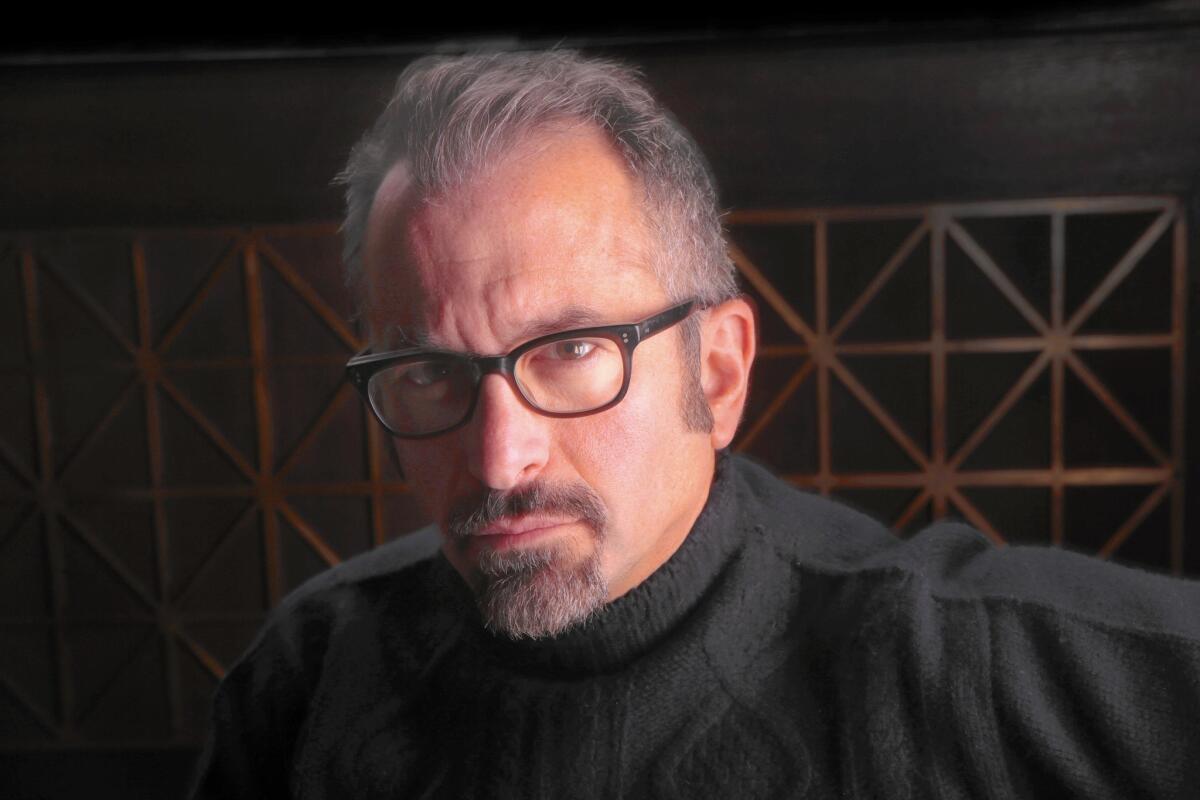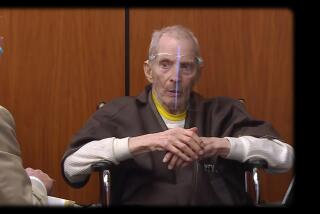‘The Jinx’ director Andrew Jarecki knows the milieu of Robert Durst

Reporting from New York — Filmmaker Andrew Jarecki has followed an unlikely path to documentary fame.
Along with his father, the Princeton graduate founded the ticketing service Moviefone in 1989 and sold it to AOL 10 years later for $388 million. Before he tried his hand at directing, he co-wrote the theme song to the 1990s drama “Felicity” with fellow emerging director J.J. Abrams.
In some ways, Jarecki acknowledges, his background shares similarities with that of Robert Durst, the subject of Jarecki’s HBO documentary series, “The Jinx.” Durst, the eldest son of a family that control’s some of Manhattan’s priciest real estate, was arrested Saturday in connection with the 2000 slaying of his friend, Susan Berman.
Jarecki grew up in the tony enclave of Rye, N.Y., and now lives on the Upper East Side of Manhattan. His father, Henry, is a Yale-trained psychiatrist turned highly successful commodities broker, and his mother, Gloria, was once a film critic for Time magazine.
“There are obviously huge differences between our lives, but I do know the feeling of growing up in NYC, growing up in Westchester [County],” Jarecki, 51, said in an interview with The Times last month, noting that re-creations of Durst’s mother’s suicide that appeared in “The Jinx” were actually filmed at the house where he grew up as a child.
“I think in some ways I can imagine what it would be like to grow up without his mother and yet with these expectations and the sense that he would take over this family business. I feel like I have a bit of a line into that,” he said.
The documentary also suggests that Durst was involved in the 1982 disappearance of his wife, Kathie Durst, but no charges have been filed in that case. Durst confessed to dismembering his elderly neighbor Morris Black in Galveston, Texas, in 2001, but claimed self-defense and was found not guilty of murder.
In the finale of “The Jinx,” which aired just a day after Durst’s arrest, a live microphone catches the wayward real estate scion making what appears to be an inadvertent confession. “Killed them all, of course,” he mumbles to himself while on a trip to the men’s room.
If there is a Jarecki family business, it’s film: In addition to his movie-critic mother, Jarecki has two brothers who are also successful filmmakers. His brother Eugene has directed two Sundance Grand Jury Prize-winning documentaries — “Why We Fight,” an examination of the military-industrial complex, and “The House I Live In,” a critical look at the war on drugs. And his younger half-brother Nicholas helmed the feature “Arbitrage,” which starred Richard Gere as a Bernie Madoff-esque hedge fund manager and screened at the Sundance Film Festival in 2012.
Andrew Jarecki made his name as a director with the 2003 documentary “Capturing the Friedmans,” which told the story of a Long Island father-and-son duo who pleaded guilty to child molestation. The documentary, pieced together from sometimes painfully intimate home videos, was widely praised, earning an Oscar nomination, a Sundance Grand Jury Prize and a New York Film Critics Circle award.
“Capturing the Friedmans” raised questions about the guilt of Jesse Friedman, who was convicted as a teenager and was freed from prison in 2001, and spurred legal developments that are ongoing. Jarecki remains directly involved in the case, and has devoted considerable time over the past decade to fighting for Friedman’s exoneration.
“That to me is when it gets the most interesting,” Jarecki told The Times, “when you’re working on something and there’s a real-world impact.”
“The Jinx” is actually Jarecki’s second attempt at telling Durst’s bizarre life story, following the feature “All Good Things,” which starred Ryan Gosling as a barely fictionalized version of the millionaire. The film was eviscerated by critics and made little impression when it was released, after a protracted delay, in 2010.
It was Durst who, after hearing about “All Good Things,” originally reached out to Jarecki about working together. Rather incomprehensibly, given that the film strongly implies he is culpable in the murders of three people — and even a dog — Durst told Jarecki it had moved him to tears. Against the objections of his attorney, Durst agreed to sit for interviews. Over three days in 2011, the director filmed more than 20 hours of conversation with his subject.
“[It] was like three days of just me asking him every question I ever wanted to ask him,” Jarecki said. Not knowing what he would do with the footage, he used an intentionally generic setup like those used on newsmagazine shows. Later, he told The Times, he shared it with his friends Mike Nichols and Diane Sawyer. Sawyer advised against bringing it to network television, according to Jarecki, and suggested a feature-length film would be necessary to provide enough context on the case.
“We realized we were talking about an improbably giant production,” Jarecki said. “We knew we were going to need to cover 30 years of this history, three different murder cases and his early life and all that. Ultimately we cut together maybe a four-hour movie.”
The project eventually landed at HBO, which had shown “Capturing the Friedmans.”
“We felt that they were going to be as enthusiastic about the sheer weirdness of this and the unusual quality of it as we were,” Jarecki said of the network in January at the Television Critics Assn. press tour in Pasadena. “I think creatively that’s exactly where you would want to do this. It’s hard to think of it at a different place.”
It’s safe to say “The Jinx” has already made more of a dent than its fictional precursor.
Though many are cheering what they say is long-delayed justice, Jarecki and his producer Marc Smerling are also facing scrutiny over the suspiciously fortuitous timing of Durst’s arrest and the fuzzy chronology of events presented in the series. The finale of “The Jinx” implies that Durst only agreed to sit for the fateful follow-up interview after he was arrested for trespassing at his brother’s Manhattan home.
That arrest occurred in August 2013, but according to the New York Times the second interview with Jarecki was conducted more than a year before that, in April 2012.
When asked Monday about this apparent inconsistency, Jarecki told the New York Times, “I think I’ve got to get back to you with a proper response on that.”
Jarecki also told Gayle King on “CBS This Morning” that “many months” passed between the interview and the discovery of the incriminating audiotape, which had been handed over to police months earlier.
“The truth is that we hoped Robert Durst would be arrested as soon as possible,” he said, “and we were sort of amazed ourselves that he hadn’t been arrested for so long.”
Jarecki and Smerling canceled a scheduled interview with the Los Angeles Times on Monday morning, and reportedly backed out of speaking with outlets including BuzzFeed and Rolling Stone and appearances on “The Tonight Show” and “All In With Chris Hayes.”
Through his publicist, he provided a statement: “Given that we are likely to be called as witnesses in any case law enforcement may decide to bring against Robert Durst, it is not appropriate for us to comment further on these pending matters.”
More to Read
The complete guide to home viewing
Get Screen Gab for everything about the TV shows and streaming movies everyone’s talking about.
You may occasionally receive promotional content from the Los Angeles Times.






